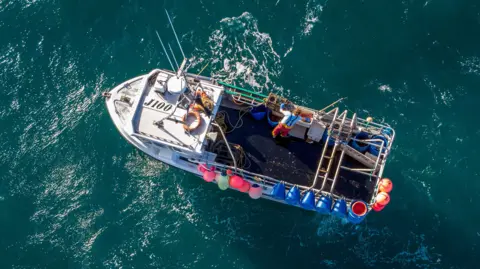In the recent discussions surrounding the fishing industry, a deal between the UK and the EU has sparked significant discord among stakeholders, especially in Scotland. The agreement, celebrated by some, has been met with vehement criticism from others, particularly the Scottish Fishermen’s Federation (SFF). According to the SFF, the 12-year treaty essentially represents a capitulation of UK interests to EU demands, raising severe concerns regarding the future of Scotland’s fishing industry.
The Labour government, spearheaded by Sir Keir Starmer, has established a framework that extends current access for EU fishing vessels in exchange for reduced regulations and checks on exports of food products from the UK to the European Union. This agreement, however, has not been universally welcomed. Many in the Scottish fishing community are disillusioned, labeling it “disastrous.” Deputy First Minister Kate Forbes referred to the deal as a “great betrayal” of the fishing fleet, emphasizing the detrimental impact it could have on Scottish fishermen.
Conversely, the fish farming sector appears more optimistic. Salmon Scotland, a trade body representing this industry, has touted the agreement as a means to abolish bureaucratic barriers, potentially allowing easier access for their products to the lucrative EU markets. This highlights a division in the outlook regarding the deal – while fish farmers anticipate growth, traditional fishermen voice fears of losing ground.
The prime minister, during the landmark UK-EU summit where the deal was unveiled, described the arrangement as a “win-win” situation. He affirmed that it would eliminate trade barriers, alleviating the complexities involved in selling Scottish products in Europe. Nevertheless, these assertions contrast sharply with the apprehensions expressed by fishing representatives, who feel that their industry’s needs have been overlooked. The deal not only maintains current fishing quotas but does not promise any increased benefits for British fishermen as EU vessels continue to access UK waters.
Major stakeholders have expressed their concerns. Elspeth Macdonald, the chief executive of the SFF, articulated her fears that the agreement could strip the UK of its negotiating leverage in future discussions with the EU. She lamented what she sees as a total capitulation rather than a negotiation, emphasizing the need for a more favorable arrangement for Scottish fisherfolk.
Amidst this criticism, some have attempted to draw positive developments from the agreement. Tavish Scott, representing Salmon Scotland, indicated that the updated deal could significantly cut down on the time and effort involved in exporting products to the EU. The trade body noted that international sales of Scottish salmon reached a record high in 2024, attributing much of that success to lucrative markets within Europe.
However, the historical context of fishing negotiations is fraught with grievances. Mike Park from the Scottish White Fish Association characterized the current agreement as an “utter betrayal,” underscoring a long-standing issue where the fishing industry feels undervalued and exploited in broader negotiations. Historical references to past administrations further fuel the narrative that the fishing industry has often been sacrificed for the sake of securing more significant, comprehensive trade agreements.
Political leaders, including Scottish Conservative MP Harriet Cross, have joined the chorus of discontent, branding the deal a “surrender.” Cross noted that fishermen have been manipulated as mere pawns in political games resulting in adverse consequences for Scotland’s coastal communities.
In response to the dismay among fishermen, the UK government has pledged a £360m investment initiative aimed at bolstering coastal areas. This fund is proposed to facilitate technological advancements, workforce training, and overall revitalization of these communities. However, whether this financial backing will alleviate the dissatisfaction of fishing communities remains to be seen.
Conclusively, this deal encapsulates a broader struggle within Scotland’s fishing sector—a clash of competing interests and the constant jostle between maintaining national sovereignty and engaging in beneficial trade. As stakeholders navigate this complex landscape, the ramifications of such agreements will undoubtedly shape the future of Scotland’s crucial fishing industry.



